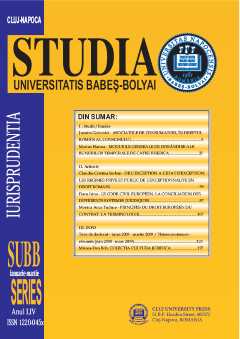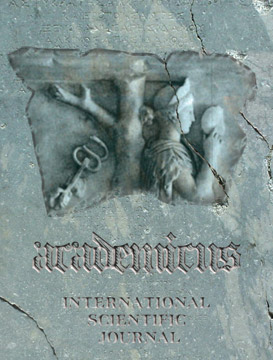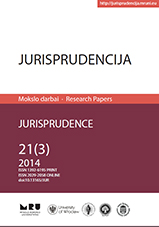Celosvětová regulace biologických věd
Die politische Meinung, únor 2007, číslo 447, s.55-63, přeložil Milan Churaň
More...We kindly inform you that, as long as the subject affiliation of our 300.000+ articles is in progress, you might get unsufficient or no results on your third level or second level search. In this case, please broaden your search criteria.
Die politische Meinung, únor 2007, číslo 447, s.55-63, přeložil Milan Churaň
More...
The aim of the article is to explain the renewed primary and secondary law-making in the EU context. The article defines international treaties and secondary law; classifies international treaties, indicates the status of secondary laws; and introduces the law-making procedures under international law, EU law, and Estonian law. The main general conclusions are that international treaties that for the purposes of this article are defined as international agreements concluded between states and / or international organizations in written form and governed by international law, can be classified as private law treaties or contractual treaties, and law-making treaties. The latter in turn can be divided into constituent international treaties and common international treaties. This is how treaties can also be defined and classified under EU law that distinguishes between the constituent treaties and international agreements. For the purposes of this article, the EU’s international agreements are defined as the EU’s agreements with third countries and / or international organizations, and the delegation for concluding such treaties comes from the constituent treaties. The EU’s international agreements can be classified by division of competences between the EU and its Member States; by subject-matter, by parties, etc. – also depending on which classification the negotiation and conclusion procedures of the agreements differ. Based on the constituent treaties of the EU, the legal acts of the EU, the constituent treaties foreseeing the legal acts, the competent institution, the procedure, and the form of the act are adopted. The article gives also an overview of the Council and Commission legislation, and the renewed consultation procedure, ordinary legislative procedure, and consent procedure. In the end, the article demonstrates that the developments in Estonian law reflect the international and EU law-making developments.
More...
A critical review on Gábor Halmai's and Attila Gábor Tóth's (eds.) "Emberi jogok [Human Rights]".
More...
Corporate Governance in the Romanian Banking System. The Corporate Governance concept and instrumentation were significantly challenged by the recent financial crisis, with the result of retaining a more pronounced regulatory nature. It is now clear that better governance may only be achieved through better regulation. The financial crisis context tendered the acceleration of banking corporate governance costumization, while both the business environment and the public policies bring their attention to the radical improvement of governance practices. Using the empirical method of the questionnaire and through the direct contact with executive banking lawyers, it was found that procedures concerning the activity of financial institutions bodies, as well as the protection of minority shareholders only reveals punctual issues that may be solved without regulatory intervention (e.g. usage of independent or at least outside directors in baks’ boards, procedures related to the management transparency ec.). The most relevant issue is the necessity of reconceptualizing the significancy of banks’ relationship with the stakeholders. The replacement of financial institutions’ relationship with the clients (in both deposits and credits) and the government should begin from recognizing their importance in the content of corporate interests’ concept. In the banking field, the maximization of shareholders value as prevaling orientation the corporate managers is limited by the public significance of these financial institutions’ activty. Therefore, one should seriously take into consideration a new orientation of the law and jurisprudence with the view of recognizing – at a certain extend - the directors duties of care and dilligence to the benefit of stakeholders. Such resettlement would allow banks to get back from the role they assumed before criss – which was the care of showing huge profits on short term – to their fundamental role as financial intermediary in which long term relationship with clients prevails.
More...
Les méthodes auxquelles le droit international privé fait appel afin de gérer la diversité législative portent aujourd’hui l’empreinte de l’intégration juridique européenne. Le rappel des techniques utilisées par le législateur de l’Union pour réaliser cette intégration permet de vérifier que celle-ci n’implique pas nécessairement la disparition des conflits de lois ; mais si habituellement les conflits sont réglés par la mise œuvre soit des règles de conflit, soit d’éventuelles lois de police, la prise en compte de la donnée européenne apporte des modifications non négligeables dans la place respective de chacune de ces méthodes, du moins pour les situations intra-européennes. L’exemple de la directive sur les offres publique d’acquisition sert d’illustration pour le nouvel équilibre, marqué par une forte perte de terrain des lois de police nationales et, corrélativement, par la valorisation des règles de conflit.
More...
Est-ce qu’il existe en Roumanie deux unions nationales des barreaux des avocats ? Cette étude aborde des aspects épineux sur la profession d’avocat en Roumanie, des aspects qui ont provoqué et provoquent toujours des passions, surtout parmi les avocats. Les auteurs observent que dans notre système de droit il y a plusieurs entités des avocats qui portent le même nom, c’est-à-dire, faisant référence surtout à l’entité nationale des avocats, l’Union Nationale des Barreaux de Roumanie, la première intitulée traditionnelle, et une autre nommée Bota. En essayant de clarifier la dispute entre les deux entités des avocats (et, parmi leurs éléments composants, c'est-à-dire les barreaux), cet étude présente l’histoire de l’UNBR traditionnelle et de l’UNBR Bota. Ensuite, une courte présentation de la « guerre » entre les deux UNBRs, exposant surtout les allégations des partisans d’UNBR traditionnelle, respectivement de l’UNBR Bota. Ensuite, aux paragraphes no.10-13, sont présentés les arguments pour lesquels l’UNBR traditionnelle est vue comme la seule de notre système juridique, et l’UNBR Bota est considérée comme n’existant pas du point de vue juridique (ou, dans une exposition plus large, les éléments Bota sont considérés comme inexistants du point de vue juridique). De même, aux paragraphes no.14-16, on parle des infractions commises par les « avocats » Bota. Certaines observations conclusives représentent le paragraphe final de l’étude intitulée « Est-ce qu’il y a, dans notre système juridique, deux Unions Nationales des Barreaux de Roumanie ? »
More...
Propter veteris iuris imitationem? Qu’est-ce qu’il y a de nouveau en matière successorale dans le nouveau code civil roumain. La proche entrée en vigueur d’un nouveau code civil provoque une réflexion sur son caractère innovateur. Est-ce qu’il est vraiment un nouveau code ? La réponse est offerte en analysant son quatrième livre intitulé Des héritage et libéralités. Les dispositions nouvelles par rapport au code de 1864 seront identifiées suite à une analyse texte par texte, en faisant en même temps une synthèse d’actualité pour chaque problème envisagé.
More...
Abnormal neighbourhood nuisances – evolution and perspectives. Our neighbour: his lifestyle, his activities, his pet, his new building, his noises, in a few words, HE and his habits. Neighbourhood relationships have developed rapidly, conquering new legal meanings. Today we no longer doubt the autonomy that the neighbourhood nuisances’ theory has gained over the abuse of rights theory, and even over common civil liability. Albeit the Romanian Civil Code pictures it as a monologue between the owner and its land, the property right does not have to selfishly take into consideration only the proprietor, but also its neighbours and their legitimate rights, this being the part where legal remedies outlined by the doctrine come into force. Thoroughly analysing the present and the future of the neighbourhood nuisances in the Romanian legal system, we have observed that the legislator, after not paying any attention to this issue in the 1865 Civil Code, has now introduced it in the New Civil Code, but has failed in finding the appropriate way to do so. Despite all controversy, neighbourhood relationships, although determined by property location, are not literally land confrontations, but situations where one must accept reasonable behaviour and dismiss intolerable neighbourly demeanour. Still there remains a question to be answered and its response can be found in the conclusive remarks of our study: “Like your neighbour as you like yourself – utopia or necessity?”
More...
L’affectation - le deuxième critère principal qui doit être rempli pour qu’un bien puisse être considéré comme appartenant au domaine public - représente une question juridique trop peu étudiée par notre droit administratif. Ses implications dans le processus d’implémentation de la Loi no. 10/2001 ont été analysées encore moins. L’affectation peut-elle empêcher la restitution à l’ancien propriétaire ou à ses héritiers d’un bien confisqué de façon abusive pendant l’ancien régime? Cette question constitue l’objet d’étude du présent article. Ainsi, dans le “droit commun” (administratif), le principe consiste à considérer que l’annulation du titre de l’État (ou de l’unité administrative territoriale) entraîne l’annulation du régime domanial (l’inaliénabilité spécifique de celui-ci n’étant pas en mesure d’empêcher la restitution du bien à l’ancien propriétaire). Cependant, d’autre part, notre système juridique a emprunté le principe français (contraire au principe allemand), selon lequel le bien lui-même est inaliénable, et pas seulement son affectation. Malgré ça, la loi spéciale établit une solution partiellement différente pour les diverses situations qui peuvent apparaître en pratique: a) dans l’hypothèse où les terrains sont soumis à des servitudes légales ou à des aménagements d’utilité publique rurale ou urbaine, l’affectation, cause de l’inaliénabilité, prévaut à la restitution en nature; autrement dit, l’affectation, qui exprime l’intérêt public, l'emportent sur le caractère abusif de la nationalisation du bien, de sorte qu’en guise de réparation il y aura restitution d’un équivalent; b) dans l’hypothèse des immeubles – bâtiments destinés à l’usage d’un service public, l’immeuble doit être restitué en nature; cependant, l’affectation subsiste – temporairement – de sorte que c’est elle et non pas le bien qui est “inaliénable” pour quelque temps. Le traitement différent s’explique par des raisons pécuniaires et de mutabilité du service public.
More...
Numerele 4/2010 şi 1/2011 sunt dedicate memoriei profesorului Tudor Drăganu
More...
Der Zweck dieses Aufsatzes ist, nach den im Laufe mehrerer Jahre, durch Teilnahme an verschiedenen internationalen Konferenzen gesammelten Erfahrungen im Bereich des Schadenersatzrechtes, einige Schlussfolgerungen über den Schmerzensgeldanspruch im gegenwärtigen rumänischen Zivilrecht zu ziehen. Es wurde in Betracht genommen, dass sich das rumänische Schadenersatzrecht, wie auch das ganze rumänische Zivilrecht, in einer Übergangsperiode befindet. Die Grundsätze des geltenden Schadenersatzrechtes, also auch bezüglich des Ersatzes des immateriellen Schadens, sind ausschließlich ein Werk der Rechtslehre und der Rechtssprechung, die auf nur 6 Paragrafen des alten Zivilgesetzbuches beruhen. Das neue Zivilgesetzbuch von 2009 bringt eine viel ausführlichere Regelung (46 Paragrafen) mit sich, welche die wichtigsten von der Rechtslehre bestimmten Grundsätze mit einbezogen hat, ist aber noch immer nicht in Kraft getreten, also kann als Rechtsquelle noch nicht in Betracht genommen werden. Es ist erfreulich, dass im neuen ZGB der Grundsatz des Schadenersatzes für immaterielle Schäden zum ersten Mal ausdrücklich vorgesehen ist. Leider ist die Regelung sehr summarisch, sehr kurz im Verhältnis zu den zahlreichen Aspekten die in den letzten Jahren von der Rechtssprechung und von der Rechtslehre hervorgehoben wurden. Zwar sind alle drei, von der rumänischen und französischen Literatur, nach dem Kriterium des Bereiches der menschlichen Persönlichkeit die verletzt wurde, zusammengestellte Kategorien von immateriellen Schäden vertreten: Verletzungen der körperlichen Persönlichkeit (Körperschäden); Verletzungen der affektiven Persönlichkeit (der Affektivität); Verletzungen der sozialen Persönlichkeit.
More...
L’affectation – fin de non-recevoir de la revendication des immeubles nationalisés de façon abusive par le régime communiste? L’affectation – le deuxième critère principal qui doit être rempli pour qu’un bien puisse être considéré comme appartenant au domaine public - représente une question juridique trop peu étudiée par notre droit administratif. Ses implications dans le processus d’implémentation de la Loi no. 10/2001 ont été analysées encore moins. L’affectation peut-elle empêcher la restitution à l’ancien propriétaire ou à ses héritiers d’un bien confisqué de façon abusive pendant l’ancien régime? Cette question constitue l’objet d’étude du présent article. Ainsi, dans le “droit commun” (administratif), le principe consiste à considérer que l’annulation du titre de l’État (ou de l’unité administrative territoriale) entraîne l’annulation du régime domanial (l’inaliénabilité spécifique de celui-ci n’étant pas en mesure d’empêcher la restitution du bien à l’ancien propriétaire). Cependant, d’autre part, notre système juridique a emprunté le principe français (contraire au principe allemand), selon lequel le bien lui-même est inaliénable, et pas seulement son affectation. Malgré ça, la loi spéciale établit une solution partiellement différente pour les diverses situations qui peuvent apparaître en pratique: a) dans l’hypothèse où les terrains sont soumis à des servitudes légales ou à des aménagements d’utilité publique rurale ou urbaine, l’affectation, cause de l’inaliénabilité, prévaut à la restitution en nature; autrement dit, l’affectation, qui exprime l’intérêt public, l'emportent sur le caractère abusif de la nationalisation du bien, de sorte qu’en guise de réparation il y aura restitution d’un équivalent; b) dans l’hypothèse des immeubles – bâtiments destinés à l’usage d’un service public, l’immeuble doit être restitué en nature; cependant, l’affectation subsiste – temporairement – de sorte que c’est elle et non pas le bien qui est “inaliénable” pour quelque temps. Le traitement différent s’explique par des raisons pécuniaires et de mutabilité du service public.
More...
There are many intersections in ancient Roman and African law and a superficial analysis of orality in the Roman law of contract provides insights that one could usefully employ in understanding the African law of contract. In Roman law, contracts could be constituted by words only but to incur liability the words had to be concretised by an “outward ritual”. In African law purely verbal agreements did not give rise to legal liability. Transfer of property, related or unrelated to performance in terms of the contract gave rise to liability and in that sense contracts in African law differed from real contracts in Roman law. The prevalence and endurance of the stipulatio in early Roman law have been ascribed to the importance of the Roman virtue of fides. It was the non-specialised nature of African law rather than the lack of fides that explains why purely verbal contracts were unknown in African law.
More...

Terrorist acts have been a worrisome phenomenon for all nations. Paradoxically, although states have been conscious about the danger of this phenomenon, there is no definition of terrorist acts so far. States have been skeptical and they have not agreed that the judgment of these criminal offences be performed by international jurisdictions, thus opting for the domestic jurisdiction. Nevertheless, states have lacked the willingness to establish joint criminal policies and find efficacious means to combat these terrorist acts. One of these efficacious means has been the seizure and confiscation of licit and illicit assets possessed by terrorist groups. This is the focus of this short study, which will be inclusive by viewing this topic under the general framework of international acts, our domestic legislation, as well as the American one. This paper aims at presenting the legislative measures taken by the Albanian state to meet international requirements. It endeavors to provide arguments why all licit and illicit assets associated with terrorist acts are seized and confiscated. Special attention is paid to the way these assets are administered. Moreover, this study tries to analyze the achievements and problems in Albania, as well as provide conclusions and recommendations.
More...
Economic, social and cultural right (“social right”) have historically been viewed as distinct in natyre and scope from civil and political right. Rather than being viewed as judicially enforceable rights of immeadiate application, such rights have widely been considered non-justiciable programmatic goals to be archieved progressively within available resources, through political processes. The purpose of this paper is to provide the legal and analytical tools to understand why this dichotomy is false. The paper will consider the international normative framework for the legal protection of social rights, the specific content of state obligations under treaties dealing with such rights, how the international social rights monitoring system functions, and the various obstacles and opportunities currently facing the judicial enforceability of social rights. In every society there is violation which implies its citizen not get proper social right, economical right and cultural right. Proper implementation and adoption of judicial enforcement can reduce this violation rate and established social peace. Step mentioned in the above might not perfect but it might be small starting and ensure social, culture & economical right for the people living in the society.
More...
Factoring contract is a new phenomenon, compared to earlier forms of commerce in juridical circulation. Factoring is a method used by a firm to obtain cash when available cash balance, held by the firm, is insufficient to meet current obligations, and accommodate its other cash needs, such as new orders or contracts. The use of factoring to obtain the cash, needed to accommodate the firm’s immediate cash needs, will allow the firm to maintain a smaller ongoing cash balance. By reducing the size of its cash balances, more money becomes available for investment in the firm’s growth. A company sells its invoices at discount to their face value when it calculates that it will be better off proceeding to bolster its own growth than it would be by effectively functioning as its “customer’s bank”. Many businesses have cash flow that varies. A business might have a relatively large cash flow in one period, as well as a relatively small cash flow in another period. Because of this, firms find it necessary to both keep a cash balance on hand, and use such methods as factoring, in order to enable them to cover their short term cash needs in those periods in which these needs exceed cash flow.
More...
Electoral behavior is a new element in the political analysis of democracy in Albania. Distinctive features of the Albanian transition distinguish other models of the former communist countries, as well as significantly differ with Western models and electoral behavior analysis of the relations between political actors and citizens voting. Penal Code of the Republic of Albania remains the basis of criminal law to sanction criminal acts in the election. The object of criminal misconduct are directly related to the normal criminal and legal protection and free elections as well as the Albanian Constitution provides all these obstacles to electoral subjects committed by force or by any other means which directly affect the normal performance electoral system. Barriers can be done with physical or psychological, and consists in blocking commissioners election materials, election materials decay affecting decay electoral system unfairly supported a particular political party or a coalition of political parties that present list candidacy according to the rules defined in the electoral code. Albanian Constitution as the fundamental law of the Albanian state provides for the rightness of the equality of the vote for all Albanian citizens The vote is the democratic way that every citizen expressing the opinion and its political will but to have democratic value ratings should be personal equal, free and secret. The right to vote is a political right provided by the Albanian Constitution and the Universal Declaration of Human Rights and as such is closely linked to democracy, the sovereignty of the people and citizens. Total vote, or the right to get to the polls all Albanian citizens, men and women, and in fact is the greatest achievement of the twentieth century. According to the Electoral Code of the Republic of Albania every citizen exercises his right to vote at his polling station, where placed under citizen’s location criteria. Voting centers organized in such a way as to facilitate the voting process and ensure the secrecy of the vote. Democracy lives by opinions competition. In all areas of society, in the family and at school, association and enterprise, democracy needs a social climate which stimulate open discussion on the differences of opinion.
More...
Prihvatio sam ujesen 2012. godine poziv ravnateljice Zaklade Konrad Adenauer Stiftung, gospođe S abine Wölkner za suradnju na KAS-ovu projektu „Ustavna, pravna i faktička pozicija hrvatskog konstitutivnog naroda“, ne mogavši znati da ću, nešto malo kasnije, biti izabran u Ekspertnu radnu skupinu za pripremu preporuka za promjenu Ustava F ederacije BiH. Hoću reći da sam tijekom devetomjesečnog bavljenja ustavnom reformom u F ederaciji, izgubio i posljednje iluzije i o F ederaciji i o BiH u cijelosti, spoznavši pak da je BiH beskrajno podijeljena zemlja po nacionalnim i vjerskim linijama, pa potom i političkim i vrijednosnim, ma koliko to tvrdoglavo odbijale priznati, primjerice, bošnjačke političke elite i dijelovi tzv. međunarodne zajednice, kojima se bošnjačka ideologija čini manje naopaka od njezinih srpskih i hrvatskih inačica, odnosno manje opasna po krhki mir u regiji J ugoistoka Europe.
More...
The lawyer’s professional independence is considered to be the core principle of the profession. It is often used as defense against the state intervention in the regulation of lawyers. However, drivers in the legal market, such as an increase in competition, concentration of lawyers in large law firms, as well as the globalization, development of information technologies and social networks, which influence the commoditizing of the law and consumer awareness, certainly have shaken up the foundations of the legal profession and require the renewed approach to seemingly immovable values of the profession, including the principle of lawyer’s independence. Hence, the goal of the article is to answer the question whether this principle is still valid in the context of commercialization of the legal market. The first part of the article analyzes the dimensions of the principle of lawyer’s independence, i.e. independence from the state, from the client and other influences, by comparing continental and common law systems. The second part reveals how different approaches to the role of the lawyer influence the realization of this principle in legal regulation and practice. The third part is devoted to the analysis of radical changes in the legal market and new forms of legal services, such as incorporation of law firms, that affect the devaluation of the principle of lawyer’s independence. The article justifies that the lawyer’s independence from the state is realized primarily through strong self-governance and independence of the bar, but the trends in common law countries show that legal professional associations have lost their previous positions, especially in the area of self-disciplining, as they were not able to cope effectively with customers (clients) complains. In addition, the legal market liberalization reforms in Australia and the UK, which enable outside capital invest into law firms, have a tendency to expand to other jurisdictions. Changes in capital ownership structure of legal firms can change the governance and decision-making processes that may lead to the devaluation of the principle of lawyer’s independence yielding to the idea of entrepreneurship.
More...